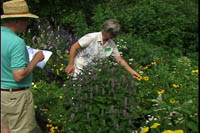Herb Garden Demonstrates Variety
Herb Garden Demonstrates Variety

An old rose from Persia, scented geraniums from South Africa, English lavender and cilantro mentioned in ancient descriptions of the hanging gardens of Babylon - an entire world of useful plants grows within a small, green-walled garden on the University of Kentucky campus.
The formal herb garden is one of the demonstration gardens in The Arboretum, the official state botanical garden for the Commonwealth of Kentucky, which is maintained by the University of Kentucky College of Agriculture and the Lexington Fayette Urban County Government. Carefully tended by a 22-member committee of Fayette County Master Gardeners from the UK Cooperative Extension Service, it is a peaceful nook enclosed by a high hedge of hollies and sprinkled with a few small trees such as sweetbay magnolia.
Master Gardeners Linda Corridoni and Bob Heister are co-chairs of The Arboretum's herb garden committee. Corridoni’s interest in the many ways herbs have been used throughout history adds to the enjoyment she gets from tending the garden.
“That’s one of the things about herbs. They’re multi-use. They’re not just exclusively culinary or medicinal,” she said.
Oregano, for example, can be used to add flavor to recipes, but it is also being studied for its antifungal properties, she said. And all the parts of a perennial onion can be used to make different colored dyes, as well as being edible. Beyond that, she said, herbs are good additions to any flower garden.
“The herbs themselves, like the French marigolds – I mean those are beautifully ornamental. Just look how gorgeous,” she said, indicating plants such as creeping Jennie, lavender and monarda.
In the center of the space is a formal knot garden whose colorful pattern is created from meticulously trimmed barberry, boxwood, thyme, oregano and the bright chartreuse leaves of creeping Jennie. The rest of the garden is divided into four sections – herbs valued for their dyes, tastes, scents and medicinal purposes.
“So many herbs have been used medicinally, historically, that almost any herb in here could be in almost any other section,” Corridoni said. “Some of these could be in the fragrance section – like the lily of the valley, though here it’s over in the dye section.”
Heister encourages people to visit the garden for ideas to use in their own landscapes.
“A big thrust of the Master Gardener program is to educate people. And that’s the intent of this site here (the herb garden) – to provide a means that people can come in, learn a little something, and go home and enjoy it,” he said.
To help visitors do exactly that, members of the committee have created a special book filled with information on each plant in the garden.
“That is a book which identifies each one of the plants, its description, its name, of course – common name, botanical name – the uses of the plant, any particular peculiar characteristics of the plant, how it should be pruned,” Heister said. “That’s meant as a reference for our purpose, for our use as well as visitors.”
A copy of the book is kept in the garden and another copy is at The Arboretum’s visitor’s center.
Both Corridoni and Heister encourage people to try herbs in their home gardens.
“For the beginning gardener, probably the thing that people will want to do is concentrate on the kitchen herbs, the things that they can get immediate use out of,” Heister said.
A site close to the kitchen door is ideal, he said, because it allows easy access to “snip the basil and the oregano and take it on inside.”
“I think, as you get beyond that and you look around and you see some of the other things here, you might get the idea of incorporating herbs into your perennial garden and your borders,” Heister said.
As for pests, herbs may be the most worry-free plant a novice gardener can grow.
“Herbs are not typically bothered by many pests at all,” Corridoni said. “There might be the occasional fungus that causes some root rot in something like thyme or even the creeping Jennies, but there are not really a lot of pest problems.”
The grounds of The Arboretum are open every day from dawn until dusk. Admission is free. For more information about any of the Master Gardener demonstration gardens in The Arboretum, call 859-257-9339 between 8:30 a.m. and 4 p.m., Monday through Friday.